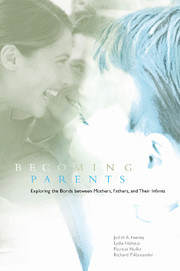Book contents
- Frontmatter
- Contents
- Preface
- 1 The Transition to Parenthood
- 2 Attachment in Childhood and Beyond
- 3 The Study
- 4 The Couples
- 5 Pregnancy and Plans for Birth
- 6 Couples' Experiences of Birth and New Parenthood
- 7 How Does New Parenthood Affect Couples?
- 8 Dealing with Depression
- 9 Men, Women, and Household Work: The Diaries
- 10 Couples' Changing Attachment Relationships
- 11 Six Months into Parenting
- 12 New Parenthood in Perspective
- Appendix A Core Questionnaires Completed by Couples
- Appendix B Summary of Sample Characteristics
- Appendix C Summary of Major Statistical Analyses
- References
- Author Index
- Subject Index
1 - The Transition to Parenthood
Published online by Cambridge University Press: 05 June 2012
- Frontmatter
- Contents
- Preface
- 1 The Transition to Parenthood
- 2 Attachment in Childhood and Beyond
- 3 The Study
- 4 The Couples
- 5 Pregnancy and Plans for Birth
- 6 Couples' Experiences of Birth and New Parenthood
- 7 How Does New Parenthood Affect Couples?
- 8 Dealing with Depression
- 9 Men, Women, and Household Work: The Diaries
- 10 Couples' Changing Attachment Relationships
- 11 Six Months into Parenting
- 12 New Parenthood in Perspective
- Appendix A Core Questionnaires Completed by Couples
- Appendix B Summary of Sample Characteristics
- Appendix C Summary of Major Statistical Analyses
- References
- Author Index
- Subject Index
Summary
The transition to parenthood is not a new topic for research and discussion. In fact, this topic has been studied at some depth for more than half a century, by researchers interested in life-span development and in the structure and functions of the family. Moreover, it has undoubtedly been discussed informally throughout most of the history of the human race, as young people have wondered about the impact of this event and their elders have tried to share their own experience and advice. In this chapter, we trace the development of studies in this area, and present the main findings that these research projects have generated.
WHY STUDY THE TRANSITION TO PARENTHOOD?
Perhaps the first question that we should consider is why the transition to parenthood arouses so much interest. At least two broad reasons can be suggested. First, parenthood is a topic that is of direct interest to most people. As children, we experience parental relationships on a personal and ongoing basis, and as adults, we may recognize that this experience plays a formative role in the way we develop and function. Further, the majority of people have at least one child during their life span, and almost everyone has seen close friends or family members dealing with pregnancy and new parenthood. This almost universal experience of parenthood applies across cultures and across eras, despite the fact that more adults in western societies are now remaining single, choosing not to become parents, or having only one or two children, than in the past.
- Type
- Chapter
- Information
- Becoming ParentsExploring the Bonds between Mothers, Fathers, and their Infants, pp. 1 - 21Publisher: Cambridge University PressPrint publication year: 2001



